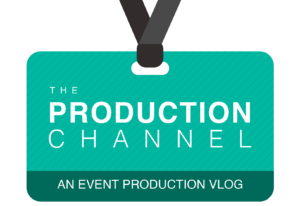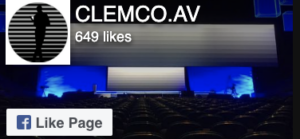The Network as an Essential Ingredient for Seeing, Believing and Achieving Success
By Cosette Strong
In this edition of our interview feature series conducted monthly, I will give you a window into chats with Clem as he shares his thoughts about a number of things, namely 2020s continued impact on our new normal and how networking is an essential part of being successful in the live event production industry. This interview took place via a virtual video chat while I was in Ohio and Clem was home in Florida.
Cosette: As you think about how relationships with people connect to being successful in this industry and transitioning from 2020 back into whatever our new normal will be, how would you say that relationships and partnerships play a role?
Clem: Every aspect of this industry and my success and the success of others I’ve known is based on relationships, friendships and partnerships. When I speak at colleges and universities we focus on the importance of networking. I guess that’s a fear or, more, a discomfort, for college students in this generation. It’s about building a network and understanding the power of networking. It’s about getting outside of your comfort zone and putting yourself out there and building those relationships. During this time of being off, with in-person events not happening the way they were, we aren’t able to build connections, bonds, and relationships the way we did. Before we’d always be together. From creating and building the event to going to lunch to going out after the show – all of that involves networking.
[Clem pauses for a second, looks away, then looks back.]
What people enjoy most in this industry is working with people they know, people they like and trust. People they want to spend time with. When we’re not able to do that as we used to that can impede those opportunities when things start back up again. If you’re not going back and building and maintaining those relationships, you’re banking on those bonds still existing when the doors open back up.
I was scheduled to work with DCE productions here in Tampa – the event was scheduled for April 2020 – it didn’t happen, but we continue to be in communication around random things – renting gear, they invited me to a BBQ at the office, talking shop – just being in contact. I got a call from a manager the other day and he asked me if I knew a camera operator named Steve Uhlmer. [Clem smiles a wide smile.] I said, “Hell yeah, I know Steve!” He was the person who got me into this industry, who got me my first job with LMG. I wrote about him in my book,Career Projection 101. When he was a camera operator for the Orlando Magic I was his Utility. He allowed me the opportunity to be a camera operator because he knew and trusted I’d do a good job. So now, I’m getting a phone call to vouch for him – the person who vouched for me back in 2002 when I first started in the industry. Of course I’m going to vouch for him because of that friendship, bond and relationship.
Cosette: What’s the difference between relationships and partnerships, or are they the same thing?
Clem: Hmmmmm. [Clem laughs, shakes his head and looks at the camera intently.] They’re not the same thing. [He looks down, then back up and leans in.] They’re not the same. You have a relationship with people – like a friendship where you know each other. You can relate when it comes to certain things. A partnership is someone who has your back – who knows what your dreams, goals and aspirations are. Someone who knows what your mission is and why you’re here. They believe in you. You believe in them. You’re bonded working together towards a common goal. That’s the difference. That’s the difference – they’re NOT one and the same.[Clem looks off into the distance.]
Cosette: What would you tell someone in your industry who’s looking to transition a relationship to a partnership?
Clem: Common ground. What’s that common ground that you believe in, what the other person believes in and what you’re looking to accomplish together? How can you build that familiarity, comfort and trust to know that, at the end of the day you have my best interest in mind? How do you know I have yours? So how to build that? By being honest, open, and transparent – having those H.O.T. conversations – about what it is you’re looking to accomplish. You can’t just partner with anyone – it’s a matter of finding that right person to work with together and building that trust from the beginning to know you’re moving forward in the right direction.
Cosette: What about a partnership that’s really important to you? Tell me about the hallmarks of it – why’s it important to you? What makes it the strong partnership it is?
Clem: One of the partnerships that changed my career is with TEK productions. They were people – Kari Hyatt – she was a person who believed in me. She believed in what I wanted to do and who I wanted to become and what I saw myself being able to do and accomplish. She gave me the opportunity – opportunity after opportunity, actually – and I continued to prove myself. First as a technician, then as a camera operator then as a video projectionist. I proved myself. Then from there, I wanted to bring others on and because they trusted me, my skills, work ethic and what I brought to the table, they knew they could trust who I brought on to do the work as well. Through that relationship and partnership my company was able to provide back-office support and perform billing services for independent contractors who worked for their company. That all started from me being a camera operator and them trusting what it was I said I wanted to do and what it was that I actually did. It continued to grow from there.
From that relationship and partnership, it brought on another partnership with Performance Paradigm. During COVID, I’ve been able to not only support myself, but also grow my company and provide jobs and opportunities for other people. This is because of that trusted bond and relationship. It’s been about forming a partnership where we can move forward with the trust and understanding that we’re moving forward toward a common goal.
Cosette: Let’s transition back a little bit… let’s revisit networking. You’ve been in the industry for a long time – you have a lot of relationships. You know the ins and outs. What would you say to someone who’s just starting out and who doesn’t really know how to build and fortify their network?
Clem: [Clem closes his eyes and squints.] How to build and fortify a network. . . Go to a networking opportunity whether from a LinkedIn group or profile or Facebook group – there are networks that already exist. If you have an interest in something and you know you want to be a part of something and develop your skills, look to join that. I have a group I started – VPSG – Video Projectionist Support Group – which is a network of video projectionists around the world. I built it as an opportunity to connect with other video projectionists so we could learn from each other. I remember the first time someone from Dubai joined – it freaked me out! [Clem laughs.]
I remember thinking that there was someone on the other side of the world who is available and willing to assist other people. So, in that same mindset bringing other people into that same network is a way to grow that bond and relationship. You can look for groups and find those opportunities and put yourself out there. Be willing to be open about the desire to learn and share.
A network is a give and take – you can’t just go in looking to take. You need to go in looking to give as well. You shouldn’t just feed off of it, but you should also look to feed it. That’s a larger network. If we think about smaller networks – getting to know someone on a personal level is feeding into them and them feeding into you so you all can grow a larger network organically.
Cosette: Then how would you advise other ways for people to leverage social media? Maybe posting, creating content, establishing oneself as an expert in the industry?
Clem: Different platforms should be used in different ways. LinkedIn is different from Facebook and Facebook is different from TikTok and Twitter. One of the best things to do is to find out how you choose to communicate. I’m an Instagram person. I’m visual and I like to tell stories on that platform through imagery. Understanding who you are and your communication style is important – start where you feel most comfortable. Start doing what you like and are good at and put that out there. If you like making videos, create some and put that out there. If you like writing, but only like short characters, you can leverage Twitter to put your opinions out there. It’s good to get on a schedule and find a rhythm, looking to constantly feed the network. If you’re looking to do that, the network will feed you. People will start to notice, start to observe and consume your content, and start to get to know the inner workings of your heart and methodology. Some will not be attracted to that, but some will and they’ll like and comment. If you continuously engage with them that’s how you’ll start to grow your network.
Cosette: Talk to me a little bit about one of the ways that you engage your network via social media
Clem: I definitely feed it. [Clem laughs.] What I’ve done is started taking what I’ve learned, felt and heard from people and tried to provide the information and resources that people may not openly say they need, want or are in search of. I also think about what I wanted and searched for and needed when I was younger in the industry. As a more seasoned professional now, I can look back at what I didn’t have and what I wish I had. Now I’m in the mindset about others thinking, “You don’t know you need this – but I know you need this and there are other seasoned professionals who know that you need this.” I’m trying to be on the forefront of feeding people the meals, content – things they may not even know they need yet. If I can give it to them in bites when they are searching, it’ll be available. Whether it’s through a video on YouTube, a newsletter like this, a social media post, a Twitter [Clem waves his hand back and forth] – a tweet [We share a laugh.] – yeah, I’m on that mission. I just can’t stop. Can’t stop, won’t stop. As Diddy would say, “Take that, take that…” [Clem gives a small smile and looks over his left shoulder at the camera.]
Networking is important and it’s only the beginning to continued success as a freelancer, independent contractor or small business owner. Part of Clem’s continued success is because of his relationships and the knowledge around how to leverage his vast network. Join me next month as Clem will share his best practices for letting a network work for you as you search for the next opportunity.





